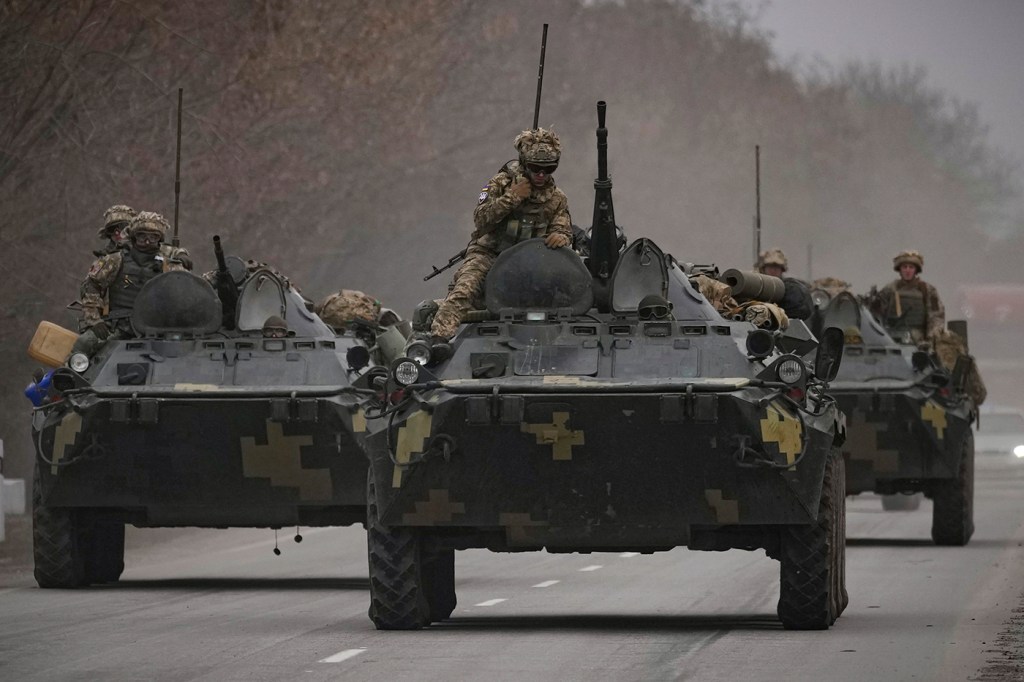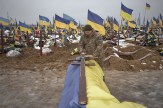What do we call what’s happening in Ukraine? Words matter

This report is part of ongoing coverage of the Russia-Ukraine war. Visit our dedicated page for more on this topic.
Russia’s invasion of Ukraine began early Thursday morning as troops began bombarding several major cities, including the capital, Kyiv.
Explosions on the ground were contrasted in the news by Russian President Vladimir Putin’s declaration of “a special military operation” to “demilitarize” Ukraine. Many observers, however, quickly dubbed the attack an “invasion.”
That distinction in terminology matters, says Pablo Calderón Martínez, assistant professor in politics and international relations at New College of the Humanities on Northeastern’s London campus. The words we use to talk about what’s happening in Ukraine could lend an unearned legitimacy to Russia’s attacks, he says.

(Left) Pablo Calderón Martínez, assistant professor in politics and international relations at New College of the Humanities on Northeastern’s London campus; (right) Mai’a Cross, the Edward W. Brooke Professor of Political Science and International Affairs and associate dean of faculty affairs, diversity and inclusion, in the College of Social Sciences and Humanities at Northeastern. Courtesy Photo and Photo by Adam Glanzman/Northeastern University
“When you talk about ‘invasion,’ it delegitimizes the exercise,” as opposed to condoning it, Calderón Martínez says. “‘Invasion’ signifies that you are unilaterally breaking the sovereignty of another nation, violating the sovereignty of another nation.”
Putin has long waged a war of disinformation to foment support for his military actions, selectively choosing phrases that would evoke a certain response in speeches and other contexts. In the case of the current invasion of Ukraine, Putin used the phrase “de-nazification” and talked about preventing “genocide.” (There is no evidence of genocide going on in Ukraine.)
“Those words are so charged with meaning, and there’s no basis in reality for those words,” says Mai’a Cross, the Edward W. Brooke Professor of Political Science and International Affairs at Northeastern. “The terminology really matters.”
Another notable distinction: Putin’s speech on Thursday has been treated as a declaration of war on Ukraine by many world leaders. U.S. President Joe Biden’s immediate response called the Russian assault “a premeditated war.”
So should we call this a war?
“Typically we think of war as clashes between two or more sides,” Cross says. “Things are changing hour to hour. But I do think that we are at the stage where Ukrainian forces are trying to battle against Russian forces.”
In the academic field of international relations, she says, when there are more than 1,000 battle-related deaths, then a conflict qualifies as a war, whether or not it has been declared as such. Ukrainian officials said that dozens of people—both soldiers and civilians—were killed in the first hours of the invasion. Invading Russian troops have continued to attack, and have captured the abandoned Chernobyl nuclear power plant.
“This is the closest we’ve been in a long, long time to traditional war,” Calderón Martínez says. Typically we think of “war” as one country going to battle against another, he says, with troops fighting one another on frontlines. “I don’t think the Ukrainian army is going to collapse,” and there will be an international dimension, too, he says.
“It’s going to be a more traditional war with more traditional battles, traditional taking territory,” Calderón Martínez says. “Territory is the objective. Russia’s objective is to take territory of Ukraine. Ukraine’s objective is to keep the territory.”
The international dimensions will be important to watch, he says, as well as the terminology used by world leaders—not just in the U.S. and Western Europe.
“Even if you are friendly to Russia, it’s very hard to support somebody redrawing borders,” Calderón Martínez says. “You undermine the whole concept of sovereignty. You start thinking, ‘Well, if Russia can do this to Ukraine, then why not me next?’”
For media inquiries, please contact media@northeastern.edu.





